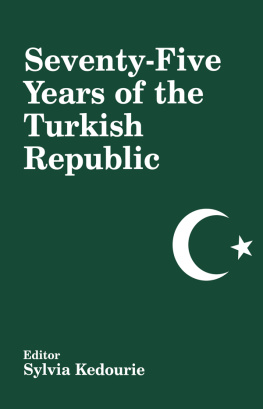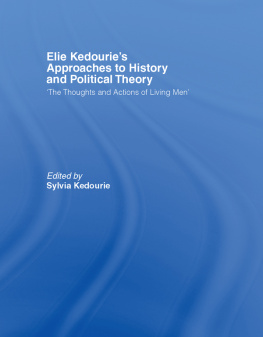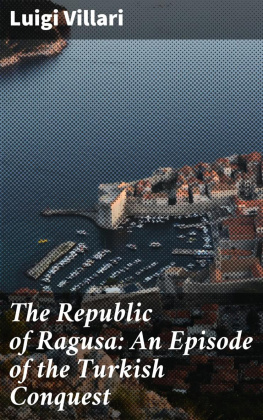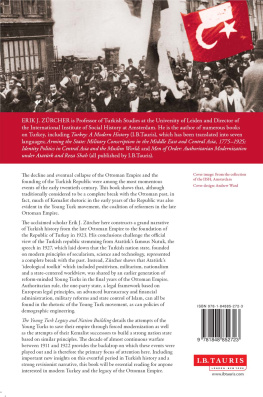First published in 2000 in Great Britain by
Routledge
2 Park Square, Milton Park, Abingdon, Oxon, OX14 4RN
270 Madison Ave, New York NY 10016
Transferred to Digital Printing 2007
Copyright 2000 Routledge
Website: www.routledge.com
British Library Cataloguing in Publication Data
Seventy-five years of the Turkish Republic
1. Turkey Politics and government 1909 2. Turkey History 20th century 3. Turkey Foreign relations
I. Kedourie, Sylvia
956. 102
ISBN 0-7146-5042-0 (cloth)
ISBN 0-7146-8099-0 (paper)
Library of Congress Cataloging-in-Publication Data
A catalog record for this book is available from the Library of Congress
This group of studies first appeared as a special issue of Middle Eastern Studies,
Vol.35, No.4, October 1999 (ISSN 0026-3206), published by Routledge.
All rights reserved. No part of this publication may be reproduced, stored or introduced into a retrieval system or transmitted, in any form or by any means, electronic, mechanical, photocopying, recording, or otherwise, without the prior written permission of the publisher of this book.
Publishers Note
The publisher has gone to great lengths to ensure the quality of this reprint but points out that some imperfections in the original may be apparent
ANDREW MANGO
Is Mustafa Kemal Atatrk, the founding father of the Turkish Republic, to blame for his countrys troubled relationship with its Kurdish-speaking citizens? In his foreword to Jonathan Rugmans fair-minded account of the problem, John Simpson, foreign affairs editor of the BBC, wrote:
In terms of ethnicity and culture, Turkey is varied, complex and intermixed. Yet the myth which Atatrk bequeathed to his fellow-countrymen insists that there is a single ethnic group, the Turks. Nowadays the effects of this myth can be brutal; it can never, in the long run, be successful. While Turkey gives no legal recognition to its large Kurdish minority, the problem that dissident Kurds pose for the Turkish state cannot be solved.1
The seriousness of the problem is undeniable. According to figures given at the end of June 1998 by the head of the anti-terrorist department of the Turkish police, the radical Kurdish nationalist organization PKK (Partiya Karkeren Kurdistan Kurdistan Workers Party), had by that time launched nearly 19,000 attacks since the beginning of its armed campaign in 1984. These caused the deaths of 5,121 members of the security forces and of 4,049 civilians, while 17,248 persons described as terrorists were killed.2 In spite of repeated assurances by the security forces that the back of the insurrection has been broken and that the PKK now numbers only 5,000 armed militants, the death toll continues to mount. As kr Elekda, the former Turkish Ambassador in Washington, has recently pointed out, the problem of the south-east (that is, the Kurdish problem) is acquiring a growing international dimension and constitutes the main and most urgent threat facing Turkey.3 In the circumstances, an elucidation of the genesis of the problem is a matter of current political, as well as of historical, importance. And since the actions and statements of Atatrk remain a source of inspiration of Turkish government policy, and tend to be used to legitimize it, it is as well to be clear about Atatrks attitude towards the Kurds.
Mustafa Kemal Paa, as he then was, did not acquire first-hand experience of Kurdish-speaking areas until April 1916, when he was promoted Brigadier-General at the age of 35, and sent to Diyarbekir (now Diyarbakr) at the head of the 16th corps, a part of the 2nd Ottoman army, which was transferred from Thrace after the withdrawal of the Allies from Gallipoli. Enver Paa, the Ottoman deputy commander-in-chief (theoretically, deputising for the elderly Sultan Mehmet V), had prepared an ambitious plan, requiring the 2nd Army in the south-east and the 3rd Army in the north-east to close in on the Russian troops, which had occupied Erzurum and were fanning out to the west and south. The plan failed, but Mustafa Kemal acquitted himself well, regaining the towns of Mu and Bitlis in the Kurdish area in August 1916. A little later, a Russian counteroffensive forced him out of Mu, and the front then remained more or less stable until the Russian Revolution the following year. In November 1916, Mustafa Kemal became deputy commander of the 2nd Army, when the commander Ahmet zzet Paa, a general of Albanian origin, went on leave to Istanbul. In March 1917, Ahmet zzet Paa was made commander of all the armies on the eastern front and Mustafa became substantive commander of the 2nd Army. He remained in the area until July 1917, when he was appointed commander of the 7th Army, part of the Lightning (Yldrm) Group, brought together in Syria under the German general (Marshal in the Ottoman army) Erich von Falkenhayn for the purpose of recapturing Baghdad from the British.4
Mustafa Kemal kept a diary between 7 November and 24 December 1916 during his service with the 2nd Army.5 He records the books he read (a French novel and two books on philosophy), his thoughts on army discipline and on the emancipation of women, and a few impressions of the ravaged countryside: Bitlis made him think of the ruins of Pompeii and of Nineveh. There is a brief mention of a volunteer detachment, organized by a local Nakibendi sheykh, of hungry Kurdish refugees, of a meeting with the tribal leader Hac Musa who commanded the Mutki Kurdish militia. Mustafa Kemals tone is remarkably detached: he observes his surroundings with the curiosity of an outsider. He does not express any views on the Kurds.
His chief of staff, Lt. Col. zzettin (later General zzettin allar) is more forthcoming in his diary.6 In the villages, there are many men capable of bearing arms, he noted on 2 May 1916. The enemy is pressing hard against their land. Yet most of them are not rushing to defend it. They will have nothing to do with military service. They do not know Turkish. They do not understand what government means. In brief, these are places which have not yet been conquered. Yet one could make good use of these people. They obey their tribal leaders and sheykhs, who are very influential in these parts.7 On 11 November 1916, zzettin commented: One must gradually set up a military organization among the Kurds. One must begin by forming units from among those who are comparatively more used to the government and are more friendly. At the same time, the government must organize to do more and increase its influence.8 Like Mustafa Kemal, zzettin notes the poverty and backwardness of local people. He hopes for a transfer from these sorrowful surroundings and says that anyone posted from the west to the east faces a hard time.9
Mustafa Kemal had one close military supporter who had a good knowledge of the Kurds. This was Col. Fahrettin (later General Fahrettin Altay, the renowned cavalry commander in the Turkish War of Independence). Born in Scutari in Albania, Fahrettin was posted to the 4th Army in eastern Anatolia in 1904, after graduating from the staff college in Istanbul.10 Fahrettin describes the posting as exile, saying that the regime of Sultan Abdlhamit suspected him of holding liberal views.11 However, he stayed on after the Young Turkish coup of 1908, and took part in a punitive expedition against Kurdish tribes in the Dersim (now Tunceli) mountains, west of Erzurum. The expedition was one of several mounted by the Young Turkish regime against dissident tribes Druzes, Arab tribes in the Yemen, Albanians which found the new constitutional order even less to their liking than Abdlhamits absolutism, and which were, in consequence, smitten harder than at the time of that manipulative sovereign.













